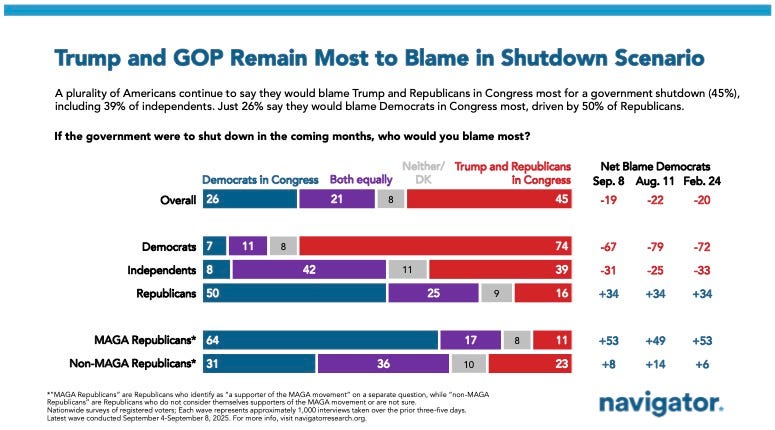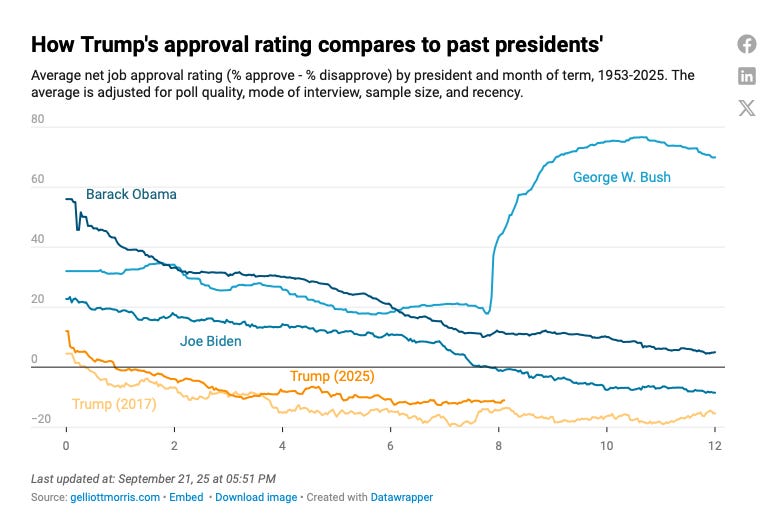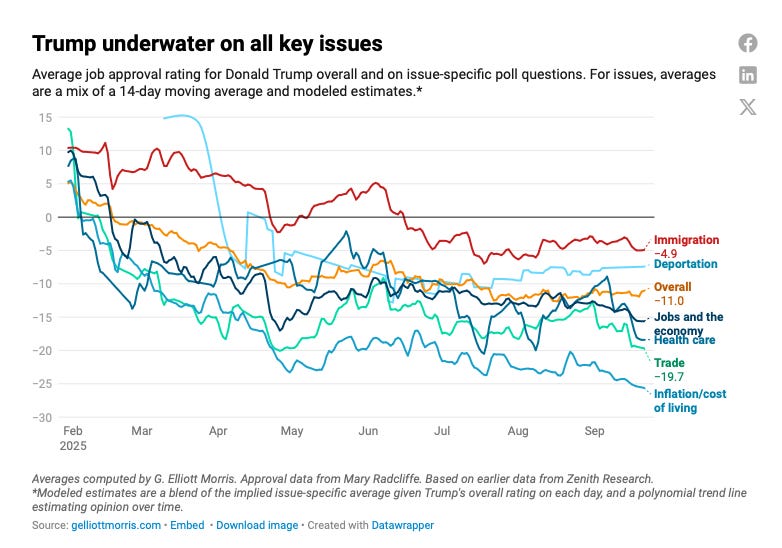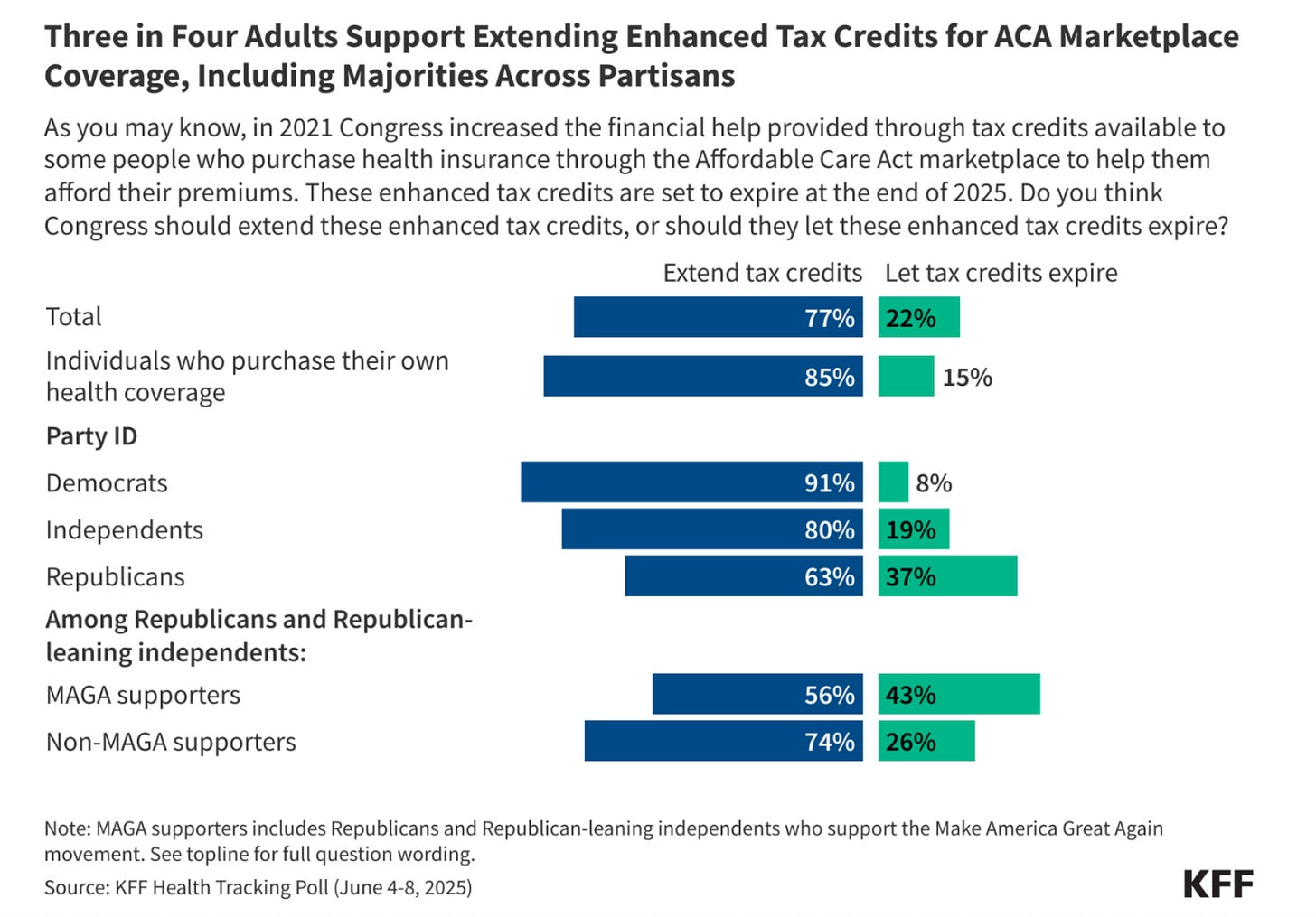Don't Believe the Hype, Dems Can Win the Shutdown Fight
Trump is so much weaker than the pundits realize
The federal government is scheduled to shut down at midnight tonight. Republicans need Democratic votes to keep it open, but they have refused to negotiate or offer any compromises in exchange. Democrats are demanding action on America’s health care affordability crisis. Among other things, they want a permanent extension of the tax credits and subsidies that lower costs for health plans under the Affordable Care Act. Without an extension, financial support will expire, and costs will rise by hundreds of dollars a month for 15 million families.
Shutdowns matter. Thousands of federal employees lose their paychecks with no guarantee of back pay. Government services are curtailed. People’s lives are disrupted. But shutdowns are also political exercises, one of the few points of leverage available to the minority party. For Democrats, this is about drawing a line. Trump has been running roughshod over the government for nine straight months — firing people, closing agencies, and shutting down programs authorized and funded by Congress. At some point, Democrats have to say “enough is enough” and use the tools they have to fight back.
I worked in the White House during one actual shutdown and several near-shutdowns. I’ve seen the damage and the dynamics up close, and I’ve been responsible for managing the political fallout. The political chattering class treats budget fights like a game with winners and losers. That may seem pedantic given the stakes, but perceptions of “winning” or “losing” matter enormously. Each side can only hold its position as long as it remains unified. If members feel they are taking on too much political water, they will force leadership to surrender.
Heading into this shutdown, the conventional wisdom is that Democrats are destined to “lose.” Even some Democrats seem to be going through the motions. Historically, the side that triggers a shutdown ends up taking the blame. That was true of Newt Gingrich’s Republicans in the 1990s. It was true of the Ted Cruz-led shutdown over Obamacare funding in 2013. And Trump took the brunt of the blame in 2019 when he shut down his own government to demand border wall funding.
This time, Democrats are technically the ones refusing to provide the votes to keep the government open, which makes them look like the “shutdown side.” And congressional Democrats often project weakness, so in the minds of pundits, it’s just a matter of time before they cave and accept scraps.
It’s possible Schumer and Senate Democrats won’t have the spine for this fight. There are already reports they’re looking for an exit. It’s also possible congressional Democrats lack the messaging discipline to win the political argument. But I think Democrats enter this fight on firmer ground than most assume.
1. Polls Show Voters Blame Trump and the GOP
This may surprise people closely following the shutdown drama, but voters are predisposed to blame Trump and the Republicans, not Democrats. A Navigator Research poll found that a plurality of Americans blame Trump and the GOP.
More importantly, 49% of voters in battleground districts blame Trump and Republicans, while just 44% blame Democrats.
Politico reported on a new Morning Consult poll with similar results:
The new Morning Consult poll, shared exclusively with Playbook, reports that 45 percent of voters are more likely to blame Republicans if there’s a shutdown, compared to 32 percent blaming Democrats — a 13-point margin. That split gets wider among independent voters, who are more likely to blame Republicans by a 17-point margin. The poll surveyed 2,202 voters last week.
These numbers could shift as the shutdown drags on, but Democrats are starting from a stronger position than most people assume.
2. Trump Is Much Weaker Than People Think
There’s a paradox at the heart of Trump: substantively, he’s powerful. Politically, he’s very weak. Trump has weaponized the government in countless ways. With the unanimous support of his party and the avarice and cowardice of business and media elites, he does what he wants, when he wants.
But Trump himself is historically unpopular, pushing an unpopular agenda, and widely seen as failing on the top issue for voters — the cost of living.
He is less popular now than Biden was at the same point in his presidency. His disapproval on inflation and affordability is as bad as Biden’s was in 2024. The only modern president more unpopular at this stage was Donald Trump in 2017.
These two charts from G. Elliot Morris put Trump’s unpopularity in perspective.
And Trump’s weakness matters. He is not a persuasive messenger to anyone outside his base. That makes him and his party more vulnerable to being blamed for the shutdown than they may realize.
3. Voters Want the Obamacare Subsidies Continued
If it were up to me, I would have made this shutdown fight explicitly about affordability, focusing on tariffs and the health care crisis. That would have been the stronger play. However, Democrats must corral more than 200 members of the House and 47 senators — a coalition that spans from AOC to Jared Golden. That reality often forces a lowest-common-denominator strategy.
Still, the Obamacare tax credits are wildly popular. A Kaiser Family Foundation poll in June found that 77% of Americans think Congress should extend the tax credits, while just 22% say they should expire.
Nearly two-thirds of Republicans — and a majority of MAGA supporters — want them extended. Even the most hardcore members of Trump’s base support these tax credits. On this issue, Democrats have both the winning argument and real leverage.
4. Where We Go From Here
I’m as nervous as anyone about the looming shutdown. Trump could use the funding lapse to wreak even more havoc on the federal government. Senate Democrats may fold at the first opportunity.
But Democratic capitulation is not inevitable. This is a fight they can win in the court of public opinion. If Democrats use this moment of public attention to show that they’re fighting to make health care more affordable, they can come out ahead.





